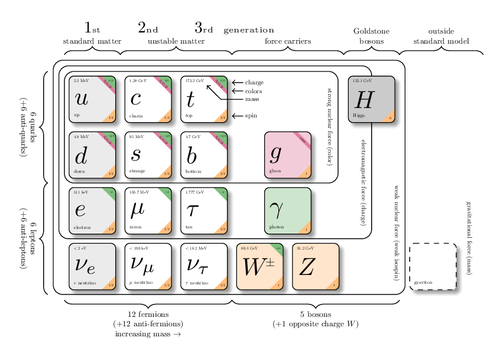A standard diagram of the current standard model of physics.
In some ways, this was the ultimate, single-diagram user experience challenge: all of our current understanding of the universe condensed into a single infographic.
This improved diagram of the standard model of physics was made at the CERN Webfest 2012 by David Galbraith and Carsten Burgard.
Source: http://davidgalbraith.org/portfolio/ux-standard-model-of-the-standard-model/
Programmed in TikZ by Carsten Burgard. TikZ styles syntax by Stefan Kottwitz.

Edit and compile if you like:
% Standard model of physics
% Author: Carsten Burgard
\documentclass[border=10pt]{standalone}
\usepackage{tikz}
\usetikzlibrary{calc,positioning,shadows.blur,decorations.pathreplacing}
\usepackage{etoolbox}
\tikzset{%
brace/.style = { decorate, decoration={brace, amplitude=5pt} },
mbrace/.style = { decorate, decoration={brace, amplitude=5pt, mirror} },
label/.style = { black, midway, scale=0.5, align=center },
toplabel/.style = { label, above=.5em, anchor=south },
leftlabel/.style = { label,rotate=-90,left=.5em,anchor=north },
bottomlabel/.style = { label, below=.5em, anchor=north },
force/.style = { rotate=-90,scale=0.4 },
round/.style = { rounded corners=2mm },
legend/.style = { right,scale=0.4 },
nosep/.style = { inner sep=0pt },
generation/.style = { anchor=base }
}
\newcommand\particle[7][white]{%
\begin{tikzpicture}[x=1cm, y=1cm]
\path[fill=#1,blur shadow={shadow blur steps=5}] (0.1,0) -- (0.9,0)
arc (90:0:1mm) -- (1.0,-0.9) arc (0:-90:1mm) -- (0.1,-1.0)
arc (-90:-180:1mm) -- (0,-0.1) arc(180:90:1mm) -- cycle;
\ifstrempty{#7}{}{\path[fill=purple!50!white]
(0.6,0) --(0.7,0) -- (1.0,-0.3) -- (1.0,-0.4);}
\ifstrempty{#6}{}{\path[fill=green!50!black!50] (0.7,0) -- (0.9,0)
arc (90:0:1mm) -- (1.0,-0.3);}
\ifstrempty{#5}{}{\path[fill=orange!50!white] (1.0,-0.7) -- (1.0,-0.9)
arc (0:-90:1mm) -- (0.7,-1.0);}
\draw[\ifstrempty{#2}{dashed}{black}] (0.1,0) -- (0.9,0)
arc (90:0:1mm) -- (1.0,-0.9) arc (0:-90:1mm) -- (0.1,-1.0)
arc (-90:-180:1mm) -- (0,-0.1) arc(180:90:1mm) -- cycle;
\ifstrempty{#7}{}{\node at(0.825,-0.175) [rotate=-45,scale=0.2] {#7};}
\ifstrempty{#6}{}{\node at(0.9,-0.1) [nosep,scale=0.17] {#6};}
\ifstrempty{#5}{}{\node at(0.9,-0.9) [nosep,scale=0.2] {#5};}
\ifstrempty{#4}{}{\node at(0.1,-0.1) [nosep,anchor=west,scale=0.25]{#4};}
\ifstrempty{#3}{}{\node at(0.1,-0.85) [nosep,anchor=west,scale=0.3] {#3};}
\ifstrempty{#2}{}{\node at(0.1,-0.5) [nosep,anchor=west,scale=1.5] {#2};}
\end{tikzpicture}
}
\begin{document}
\begin{tikzpicture}[x=1.2cm, y=1.2cm]
\draw[round] (-0.5,0.5) rectangle (4.4,-1.5);
\draw[round] (-0.6,0.6) rectangle (5.0,-2.5);
\draw[round] (-0.7,0.7) rectangle (5.6,-3.5);
\node at(0, 0) {\particle[gray!20!white]
{$u$} {up} {$2.3$ MeV}{1/2}{$2/3$}{R/G/B}};
\node at(0,-1) {\particle[gray!20!white]
{$d$} {down} {$4.8$ MeV}{1/2}{$-1/3$}{R/G/B}};
\node at(0,-2) {\particle[gray!20!white]
{$e$} {electron} {$511$ keV}{1/2}{$-1$}{}};
\node at(0,-3) {\particle[gray!20!white]
{$\nu_e$} {$e$ neutrino} {$<2$ eV}{1/2}{}{}};
\node at(1, 0) {\particle
{$c$} {charm} {$1.28$ GeV}{1/2}{$2/3$}{R/G/B}};
\node at(1,-1) {\particle
{$s$} {strange} {$95$ MeV}{1/2}{$-1/3$}{R/G/B}};
\node at(1,-2) {\particle
{$\mu$} {muon} {$105.7$ MeV}{1/2}{$-1$}{}};
\node at(1,-3) {\particle
{$\nu_\mu$} {$\mu$ neutrino} {$<190$ keV}{1/2}{}{}};
\node at(2, 0) {\particle
{$t$} {top} {$173.2$ GeV}{1/2}{$2/3$}{R/G/B}};
\node at(2,-1) {\particle
{$b$} {bottom} {$4.7$ GeV}{1/2}{$-1/3$}{R/G/B}};
\node at(2,-2) {\particle
{$\tau$} {tau} {$1.777$ GeV}{1/2}{$-1$}{}};
\node at(2,-3) {\particle
{$\nu_\tau$} {$\tau$ neutrino} {$<18.2$ MeV}{1/2}{}{}};
\node at(3,-3) {\particle[orange!20!white]
{$W^{\hspace{-.3ex}\scalebox{.5}{$\pm$}}$}
{} {$80.4$ GeV}{1}{$\pm1$}{}};
\node at(4,-3) {\particle[orange!20!white]
{$Z$} {} {$91.2$ GeV}{1}{}{}};
\node at(3.5,-2) {\particle[green!50!black!20]
{$\gamma$} {photon} {}{1}{}{}};
\node at(3.5,-1) {\particle[purple!20!white]
{$g$} {gluon} {}{1}{}{color}};
\node at(5,0) {\particle[gray!50!white]
{$H$} {Higgs} {$125.1$ GeV}{0}{}{}};
\node at(6.1,-3) {\particle
{} {graviton} {}{}{}{}};
\node at(4.25,-0.5) [force] {strong nuclear force (color)};
\node at(4.85,-1.5) [force] {electromagnetic force (charge)};
\node at(5.45,-2.4) [force] {weak nuclear force (weak isospin)};
\node at(6.75,-2.5) [force] {gravitational force (mass)};
\draw [<-] (2.5,0.3) -- (2.7,0.3) node [legend] {charge};
\draw [<-] (2.5,0.15) -- (2.7,0.15) node [legend] {colors};
\draw [<-] (2.05,0.25) -- (2.3,0) -- (2.7,0) node [legend] {mass};
\draw [<-] (2.5,-0.3) -- (2.7,-0.3) node [legend] {spin};
\draw [mbrace] (-0.8,0.5) -- (-0.8,-1.5)
node[leftlabel] {6 quarks\\(+6 anti-quarks)};
\draw [mbrace] (-0.8,-1.5) -- (-0.8,-3.5)
node[leftlabel] {6 leptons\\(+6 anti-leptons)};
\draw [mbrace] (-0.5,-3.6) -- (2.5,-3.6)
node[bottomlabel]
{12 fermions\\(+12 anti-fermions)\\increasing mass $\to$};
\draw [mbrace] (2.5,-3.6) -- (5.5,-3.6)
node[bottomlabel] {5 bosons\\(+1 opposite charge $W$)};
\draw [brace] (-0.5,.8) -- (0.5,.8) node[toplabel] {standard matter};
\draw [brace] (0.5,.8) -- (2.5,.8) node[toplabel] {unstable matter};
\draw [brace] (2.5,.8) -- (4.5,.8) node[toplabel] {force carriers};
\draw [brace] (4.5,.8) -- (5.5,.8) node[toplabel] {Goldstone\\bosons};
\draw [brace] (5.5,.8) -- (7,.8) node[toplabel] {outside\\standard model};
\node at (0,1.2) [generation] {1\tiny st};
\node at (1,1.2) [generation] {2\tiny nd};
\node at (2,1.2) [generation] {3\tiny rd};
\node at (2.8,1.2) [generation] {\tiny generation};
\end{tikzpicture}
\end{document}
Click to download: model-physics.tex • model-physics.pdf
Open in Overleaf: model-physics.tex